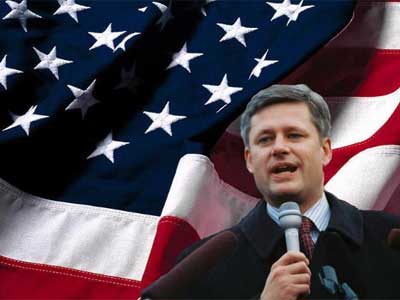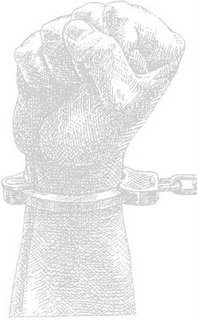It’s possible that I shall make an ass of myself. But in that case one can always get out of it with a little dialectic. I have, of course, so worded my proposition as to be right either way (K.Marx, Letter to F.Engels on the Indian Mutiny)
Friday, May 05, 2006
Grandinite Scoop
Find blog posts, photos, events and more off-site about:
IBEW, Alberta, CNRL, Fort, McMurray, TarSands, temp-workers, unions, labour, Canada
Happy Marxmas
Today is Herr Doctor Professor Karl Marx's 188 birthday.
Happy Marxmas.
Karl Marx: The Story of His Life, 1918
"Je ne suis pas Marxiste."
--Karl Marx, 1818-1883
And the good doctor in his Phd Thesis Notebooks on Epicurean Philosophy by Karl Marx posits an early theory of quantum mechanics as dialectics.
Betcha didn't know that.
"Just as we have seen that necessity, connection, differentiation, within itself, is transferred to or rather expressed in the atom, that ideality is present here only in this form external to itself, so it is with motion too, the question of which necessarily arises once the motion of the atoms is compared with the motion of the Cata tas sugcriseis [composite] bodies, that is, of the concrete. In comparison with this motion, the motion of the atoms is in principle absolute, that is, all empirical conditions in it are disregarded, it is ideal. In general, in expounding Epicurean philosophy and its immanent dialectics, one has to bear in mind that, while the principle is an imagined one, assuming the form of being in relation to the concrete world, the dialectics, the inner essence of these ontological determinations, as a form, in itself void, of the absolute, can show itself only in such a way that they, being immediate, enter into a necessary confrontation with the concrete world and reveal, in their specific relation to it, that they are only the imagined form of its ideality, external to itself, and not as presupposed, but rather only as ideality of the concrete. Thus its determinations are in themselves untrue and self-negating. The only conception of the world that is expressed is, that its basis is that which has no presuppositions, which is nothing. Epicurean philosophy is important because of the naiveness with which conclusions are expressed without the prejudice of our day."
Also See: Heisenberg's Physics and Philosophy
Find blog posts, photos, events and more off-site about:
quantum, dialectics, Epicurus, Lucritius, Marx, communism, marxism,
Humanitarian War
`It's always in Canada's interests to try to elevate... humanitarian rights.'
Peter MacKay, foreign affairs minister
A conflict that the international community has exasperated by its lack of involvement but its overflowing of crocodile tears. And would the discovery of oil reserves in the region and its neighbour Chad have anything to do with this? Nah.
 Sat Apr 29, 1:40 PM ET
Sat Apr 29, 1:40 PM ETLaura Cacho of Working Assets hands a protester a sign during a mass rally against the war in Iraq on Saturday, April 29, 2006 in New York, NY. (AP Photo/Adam Rountree)
The international community has had plenty of opportunity to intervene with armed force, to create a barrier between the refugee camps and the conflicting forces in the region. But like Rawanda the original colonial powers in the region pull the strings behind the scenes, exerting their great power influence over the region. In this case the US and Canada have less to say about this than say oh Britain and France the original Imperialist powers in the region.
The Sudan Wars were a series of conflicts in the Sudan part of Africa in the late 19th Century. The conflicts erupted between the British and the Muslims Africans in the Sudan in 1881 because of religious disputes and the British attempt to end the "new" slavery trade. Muslim fundamentalists instigated a rebellion against the British, driving them and their Egyptian armies from Sudan. Britain atoned for the loss in 1898, militarily reclaiming control of the Sudan. Following this engagement, competition between Britain and France for the south of Sudan led to military conflict, ended by diplomatic avenues which partitioned the disputed area. Both events demonstrate the intensifying struggle to control Africa, and the conflict between the European powers in the race of imperialism. This conflict gave rise to the beginning of World War I. Sudan Wars
French Equatorial Africa (Introduction)
Chad • Congo • Gabon • Central African Republic
French Equatorial Africa was a former administrative grouping of four French territories in west central Africa. It was first formed in 1910 by the federation of three French imperial colonies — Gabon, Middle Congo, and Ubangi-Shari-Chad — comprising a total area of 969,112 square miles (2,500,000 sq km). Chad was separated from Ubangi-Shari in 1920 to form a fourth colony.
In 1934, French Equatorial Africa was transformed into a unified territory of France, but in 1946 it was re-divided into four separate overseas territories (TOM — territoires d'outre-mer).
The federation ended in 1959 after the territories had chosen — in 1958 — to become self-governing republics of the French Community. Middle Congo was renamed Republic of the Congo, and Ubangi-Shari became the Central African Republic. All four republics attained their independence in 1960.
In the case of Africa, this human element is seen in the variety of forces that affected or moulded her history and experience. Lydia Polgreen summarized the roots of Africa’s present burden: Africa was a land carved for a colonial feast. For her, “it is a truism of Africa that the borders bequeathed by white colonial powers, drawn in the 19th-century scramble for Africa at the convenience of London, Paris and Brussels, became the Blackman’s burden”. And if the inherited colonial- nation state has been the Blackman’s burden, it has also been the African despot’s best friend, a powerful tool when wielded by crafty hands. In fact, the excesses of African dictators, from Mobutu Sesse Seko to Robert Mugabe, from Sani Abacha to Charles Taylor, were enabled, to a greater or lesser degree, by the inherent conflicts created by artificial state boundaries that allowed a powerful central government to play tribal, ethnic and religious groups against one another. Aligned to that, colonialism destroyed some African cultural values and structures that would have conduced to the emergence of accountability in governance. This is well depicted by the fact that until now as Ali Mazrui argued, “Africa has borrowed Western tastes without Western skills, Western consumption patterns without Western production techniques, urbanization without industrialization, secularization (erosion of religion) without scientification.” African Poverty as Failure of Leadership
Beware of war for humanity or humanitarianism, behind the rehtoric lies the profit motive. And it is the only motive that drives war, whether for good or evil.
What the postcolonial left who oppose intervention and the liberal internationalists who support intervention in Darfur (but oppose it in the Middle East) share is a common concern about the conditions of the Third World. They are likely to agree that the West is fully or partially responsible for the deterioration of those conditions. Unlike those on the right like the current President of the U.S., their foreign policy ideas transcend crass national self interests and are burdened by their moral consciences. Where they disagree however is in what role the West can play in alleviating the global south’s conditions. Where the liberals want the West to intervene to save the poor Africans from killing themselves (which can be understood in a post-Rwanda context as either humanitarianism or on the other extreme, a neo-imperial continuation of the white man’s burden), the postcolonial left want the West out of the third world. Since the West is responsible for the poverty, war and low rates of democratic and human development in places like Africa, the Middle East and beyond – vis-à-vis colonialism and neo-colonialism – they should just butt out. SkarredBlogAlso See: War and the Market State
Find blog posts, photos, events and more off-site about:
war, genocide, Darfur, Sudan, Canada, US, humanitarianism, France, Britain, colonies, colonialism, Imperialism, oil, uranium, post-colonialism, Africa, UN
Shocking Canadiana
Photo:The Economist/PA
Find blog posts, photos, events and more off-site about:
Chinese, Canada, North, Amercia, Zheng-He, discovery-of-North-Amercia, Cape, Breton, B.C., muslim, Chinese=Armada, 1421
Bermuda Triangle

Who says there is nothing new under the sun? Or in this case in the ocean where the sun never shines.
Monsters from beneath the Bermuda Triangle
In the permanently dark waters beneath the Bermuda Triangle, scientists have uncovered a remarkably diverse range of extraordinary sea creatures. Retrieving tiny sea animals - zooplankton - at depths of up to three miles, and even reading their genetic codes on a rolling sea, scientists carrying out a census of marine life have revealed new details about the role of these fragile creatures in the climate and food chain, from fish to whales.
And of course food for Cthulu's relatives.
Find blog posts, photos, events and more off-site about:
species, zooplanketon, Bermuda-Triangle, monsters, sea-monsters, Atlantic, Ocean, ocenography, biology, zoology,
octopi, squid, octopus, whales, Cthulu, Cuthulu
Bear Pickens
A black bear wandered into a grocery store in Peace River, Alta., late Tuesday, with one thing on his mind. Sweets"He jumped up into the bakery case, he tested a few things out and he really liked the strawberry mousse,'' said store night manager Trevor Allen.
He is still at large. Alberta Wildelife have issued a description of the culprit and his partner.
Find blog posts, photos, events and more off-site about:
ursus, major, bear, Peace-River, Alberta, boo-boo, yogi
Thursday, May 04, 2006
Canada's Prison Indsustrial Complex

The Harpocrites Bushite plan for crime in Canada is two fold. One is to sacrifice child care for more prison spaces...Tory plan will create jail spaces at expense of day-care spaces ...
Private prison operators waiting to cash in on Harper policies Unfortunately Canada has found out again thanks to the Harris government that this is another Harpocrite plan doomed to failure, just like their day care plan, Ontario jail privatization project fails
Harpers call to continue criminlization of marijuana and other drugs is a further example of his Republican North politics. It was the War on Drugs that opened up and exapanded the American privatized prison industrial complex that now dominates in that country.Tory policies would create prison boom: experts
And Harpers get tough on guns populist campaign coincides with his get tough on drugs and crime leading to increased spending in one of the most regressive forms of social programs, prisons.
The U.S. War on Drugs: Political Economics of a New Slavery
Compiled by Drug Policy Alliance. August 2001.
The U.S. "war on drugs" is big business -- a multi-billion dollar public/private venture that radically inflates the value of illegal drugs and is used to criminalize the poorest people of color, trapping them in a vicious cycle of addiction, unemployment and incarceration:
- $27 billion for interdiction and law enforcement, $1.3 billion for Plan Colombia in 2000.
- $9.4 billion in 2000 to imprison close to 500,000 people convicted of non-violent drug offenses, 75% of whom are Black.
- $80 to $100 billion in lost earnings.
- Untold billions in homeless shelters, healthcare, chemical dependency and psychiatric treatment, etc.
Resources on Prison Privatization
The Raggedness of Prison Privatization:
Australia, Britain, Canada, New Zealand and the United States Compared
PRIVATE ADULT PRISONS:
WHAT DO WE REALLY KNOW AND WHY DON’T WE KNOW MORE?*
New Internationalist: Crime pays: well, it does if you run the prison
Grassroots CCA Prison Report 2003
The modern private prison business first emerged and established itself publicly in 1984 when
the Corrections Corporation of America (CCA) was awarded a contract to take over a facility in
Hamilton County, Tennessee. This marked the first time that any government in the country had
contracted out the complete operation of a jail to a private operator.1 The following year, CCA
gained further public attention when it offered to take over the entire state prison system of
Tennessee for $200 million. The bid was ultimately defeated due to strong opposition from
public employees and the skepticism of the state legislature.2 Despite that initial defeat, CCA
since then has successfully expanded, as have other for-profit prison companies. As of
December 2000, there were 153 private correctional facilities (prisons, jails and detention
centers) operating in the United States3 with a capacity of over
Private Prisons: Profits of Crime
Private prisons are a symptom, a response by private capital to the "opportunities" created by society's temper tantrum approach
to the problem of criminality.The big business of prisons
By Eve Goldberg and Linda Evans
More than 1.8 million people are currently behind bars in the US -- the highest per capita incarceration rate in the history of the world. In 1995 alone, 150 new US prisons were built and filled.
Privately managed prisons go before the review boardWith 1.5 million people behind bars, the United States imprisons a larger share of its population than any other nation. Indeed, the rate of incarceration in the United States has grown much faster than the population in the past decade, leading to serious overcrowding in local, state and federal al prisons. Federal facilities are operating at 160 percent of capacity, while state facilities are at 117 percent, despite a desired capacity rate of percent that allows for periodic maintenance and repairs, special housing for protective custody, disciplinary cases and emergency needs.
The cost of confining inmates in the United States almost doubled in the past five years, reaching $50 billion lion annually, or $33,334 per inmate, per year. Estimates show that one 700-bed bed jail and one 1,600-bed prison need to be opened every week just to meet the rising demand. The projected annual construction cost of this is $5.98 billion.
But, with the political climate favoring decreasing taxes and reducing the size of government, it is unlikely that cities and counties will be able to build and manage many more prisons.
At the same time, the war on drugs and the get tough, policies, like the "three strikes" laws, will yield even greater numbers of inmates
Find blog posts, photos, events and more off-site about:
Canada, crime, prison, Harper, privatization, private=prisons, War-On-Drugs, Kropotkin, Berkman, Davis, Abolition,
Who Speaks For Canadian Women
Real Women’s letter to MP’s has called upon the Harper government to defund the powerful radical feminist lobby that allows only one interpretation of women’s rights and equality to be represented.
Lorraine McNamara, Real Women’s National President, writes, “The feminist ideology does not now, and never has had the support of the vast majority of Canadian women.”
McNamara writes, “Feminist groups have few, if any, members, and are, in effect, mostly phantom organizations sustained only by the funding they receive from the Status of Women. Since these organizations represent no one but the women who run them, they should not receive financial support from the Canadian taxpayer.”
Also see:
History of the WRF
Catholic Hajib
Whose Family Values?
Find blog posts, photos, events and more off-site about:
daycare, childcare, feminism, Canada, Real-Women, Conservatives, right-wing, anti-feminism
Must Be Nice
Gee doesn't he qualify for the Tories new get tough on crime laws. What no minimum mandatory sentence. Nah, he's rich.
And RJR/BAT profits are rising on the basis of their criminal activities. Pennsylvania Attorney General Corbett files suit to recover additional tobacco funds
Find blog posts, photos, events and more off-site about:
crime, Canada, smuggling, tobacco, RJR, taxes, tax-evasion
Who Pays The Most
With the Conservatives increase in sin taxes and income taxes to offset the GST cut and corporate tax cuts, you and me will still be paying more than those who make the profit off our labour, big business.
Which is why I say cut income taxes for all workers earning $100,000 or less, increase personal income taxes on the rich ruling class families and close their offshore loopholes, and tax capitalist businesses on their before net earnings.
Where the Money Comes From
The federal government’s budgetary revenues came from a variety of taxes and other sources.
- Personal income tax is the biggest revenue source. In 2004–05, it provided $89.8 billion in federal funding. That’s more than 45 per cent of all federal revenues.
- Revenues from the goods and services tax provided $29.8 billion, or 15 per cent of total federal funds.
- Corporate income tax raised about $30 billion, just over 15 per cent of federal finances.
- A number of other taxes—such as non-resident taxes, customs import duties, energy taxes and excise taxes on alcohol and tobacco—made up $16.7 billion, or nearly 81⁄2 per cent of revenues.
- As well, employment insurance premiums, which are treated as part of general revenues, contributed $17.3 billion to federal finances, or 8.7 per cent of the total.
- And other revenues—such as earnings by Crown corporations and the sale of goods and services—provided the remaining $14.9 billion, or 71⁄2 per cent of total revenues. This included a one-time $2.6-billion net gain from the sale of the federal government’s remaining shares in Petro-Canada.
Find blog posts, photos, events and more off-site about:
taxes, tax-cuts, tax-credit, Canada, budget, economy, government, Conservatives, Flaherty, Harper
